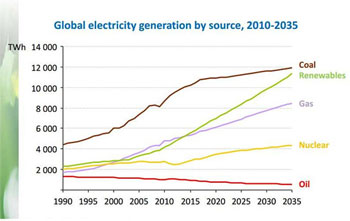This graph shows projections from the International Energy Agency and as you can see, renewable energy is about to take off to historic highs.
It shows renewable energy growing faster than natural gas around 2015 and almost catching up with coal in 2035.
While it may be surprising that coal is still king that far in the future, that will likely change as countries get much more serious about climate change long before that.

Although Europe used more coal during the "unusual" cold temperatures last winter, the trend is down again. About 28 gigawatts (GW) of coal plants are slated to close by 2020, while the EU has commitments for 161 GW of new renewable energy capacity by then.
New coal plants that have recently come online in the EU are vastly more efficient and few additional plants are planned beyond 2015.
China Gets Tough
Even China recently set a national limit on coal consumption – no more than 65% of energy use by 2017, as part of its new, tougher plan to address air pollution (it used 66.8% last year).
Last month, Beijing announced it will cut coal use in half from 2012 levels over the next five years, dropping it to less than 10% of the city’s energy mix.
China’s new five-year action plan commits to more renewables, nuclear and gas, while cutting dependence on coal. The new national target for non-fossil fuel energy is 13% by 2017 (changed from 15% by 2020). Last year, non-fossil fuels supplied 11.4% of energy.
The country has hit the limits of acceptable levels of pollution in exchange for growth. Companies are even having a hard time enticing executives to relocate there because of it.
The plan sets specific goals for pollution reduction for every city – with targets for 35 pollutants, and an accelerated monitoring program that includes a published a list of the top 10 and worst 10 cities for air pollution each month.
Old, polluting plants will be closed in the next couple of years and new ones won’t be allowed for industries that face over-capacity.
Heavily-polluting motor vehicles will be banned by 2017 and new fuel economy standards will be accelerated.

The thing I like about these predictions is that they always understate how fast Renewables actually grow.
I wonder how much of the “renewables” is hydro power. In addition these numbers are based on capacity which is vastly different from actual generation. It would be interesting to see the latter numbers since solar and wind numbers would be far less.
It would also be interesting to see how waste-to-energy plants are treated.
The stats are based on generation, not capacity, and “pure” renewables are growing much faster than hydro, but IEA didn’t indicate whether this analysis includes hydro – good point.